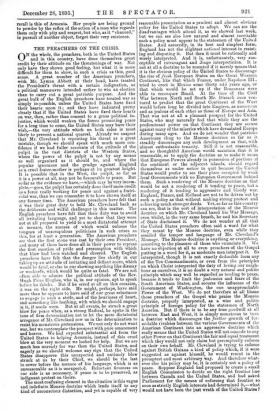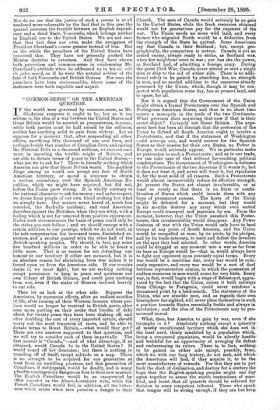THE PREACHERS ON THE CRISIS.
ON the whole, the preachers, both in the United States and in this country, have done themselves great credit by their attitude on the threatenings of war. Not only have they shown good feeling, but what it is more difficult for them to show, in such a crisis as this, good sense. A great number of the American preachers, with Mr. Lyman Abbott at their head, have treated the President's threat with a certain indignation, as a political manceuvre intended rather to win an election than to carry out a great patriotic purpose. And the great bulk of the English preachers have treated war as simply impossible, unless the United States have fixed their hearts upon it ; and they have indicated pretty clearly that if the United States have fixed their hearts on war, then, rather than consent to a gross political in- justice, which would weaken the forces promoting peace for a long time to come, the United States may have their wish,—the very attitude which on both sides is most likely to prevent a national quarrel. Already we suspect that Mr. Cleveland is repenting his threat as a great mistake, though we should speak with much more con- fidence if we had fuller accounts of the attitude of the pulpit in the vast districts of the Western States, where the power of the pulpit is not by any means so well organised as it should be, and where the popular ignorance and the grudge against England as a cruel foster-mother is perhaps at its greatest height. It is possible that in the West, the pulpit, so far as it is a power at all, may not be favourable to peace. But so far as the evidence we have,—which may be very incom- plete,—goes, the pulpit has certainly done itself more credit as a force really working for peace and against a fratri- cidal war, than we can remember it to have shown itself at any former time. The American preachers have felt that it was their great duty to hold Mr. Cleveland back as the deliberate and wilful challenger in this matter. The English preachers have felt that their duty was to avoid all irritating language, and yet to show that they were not at all prepared to yield to a most dictatorial attempt at menace, the success of which would unloose the tongues of unscrupulous politicians in such crises as this, for at least a generation. The American preachers see that the first stone was cast by their own President, and many of them have done all in their power to repress the first emotion of pride and presumption with which that blow had been watched and cheered. The English preachers have felt that the danger lies chiefly in our taking up an attitude of irritating and defiant scorn, which would be fatal, or else in our showing anything like dismay or weaknets, which would be quite as fatal. We are not often able to admire the political attitude of the Rev. Hugh Price Hughes, who is, in our opinion, apt to speak before he thinks. But if he erred at all on this occasion, it was on the right side. He might, perhaps, have said more than he appears to have said of our great reluctance to engage in such a strife, and of the heaviness of heart, and something like loathing, with which we should engage in it, if needs were. But at all events, he struck a great blow for peace when, as a strong Radical, he spoke in the tone of firm determination not to let the mere dictatorial arrogance of Mr. Cleveland cow us in the determination to resist his monstrous pretensions. We not only do not want war, but we contemplate the prospect with pure amazement and horror. We had expected substantial aid from the United States in helping Armenia, instead of this cruel blow at the very moment we looked for help. But we are much less unready for war than the United States, and eagerly as we should welcome any sign that the United States disapprove this unexpected and untimely blow struck at us by their Chief, we should be the last to cower before the menace of his language, which is as unreasonable as it is unexpected. Reluctant firmness on our side is as necessary, if peace is to be preserved, as indignant protest on theirs. The most confusing element in the situation is this vague and indefinite Monroe doctrine which lends itself to any kind of unconscious distortion, and yet is capable of very reasonable presentation as a prudent and almost obvious policy for the United States to adopt. We can see the disadvantages which attend it, as we showed last week, but we can see also how natural and almost inevitable such a policy must appear to the statesmen of the United States. And assuredly, in its best and simplest form, England has not the slightest national interest in resist- ing and disputing it. But then it must be rationally and wisely interpreted. And it is, unfortunately, very sus- ceptible of extravagant and Jingo interpretation. It is not at all a doctrine to be resented if it merely means that it is the obvious policy of the United States to discourage the rise of fresh European States on the Great Western Continent, like that which France, under Napoleon III., tried to erect in Mexico some thirty odd years ago, or that which would be set up if the Braganzas were able to reconquer Brazil. At the time of the Civil War between North and South Mr. Disraeli once ven- tured to predict that the great Continent of the West would before long be divided into Empires, as numerous and as jealous of each other as those of Europe and Asia. That was not at all a pleasant prospect for the United States, who may naturally feel that while they are the predominant power on that Continent they are secure against many of the miseries which have devastated Europe during many ages. And we do not wonder that patriotic Americans cling to the Monroe doctrine so far as it steadily discourages any such development as that, with almost enthusiastic tenacity. Still it is not reasonable, and no thoughtful American would maintain that it is reasonable, so to apply the doctrine as to make it mean that European Powers already in possession of portione bf the continent or the adjacent islands, should regard themselves as under notice to quit because the United States would prefer to see their place occupied by weak local Governments with no European Government behind them. Such a rendering of the Monroe doctrine as that would be not a rendering of it tending to peace, but a rendering of it tending to aggressive and bloody war. England, France, and Holland are not to be driven out by such a policy as that without making strong protest and achieving much stronger deeds. Yet, so far as this country can see, that is the sort of interpretation of the Monroe doctrine on which Mr. Cleveland based his War Message, even whilst, in the very same breath, he and his Secretary of State disclaimed it. We do not wonder at all that the United States preachers often said a word for what they meant by the Monroe doctrine, even while they assailed the temper and language of Mr. Cleveland's Message. The Monroe doctrine is anything or everything, according to the pleasure of those who enunciate it. We have no objection at all to even preachers of the Gospel putting in a word for it, as moderate men interpret it. So interpreted, though it is not exactly deducible from any of the Ten Commandments, or even from the principles on which Christ interpreted the duty of loving our neigh- bour as ourselves, it is no doubt a very natural and politic principle which may well be regarded as tending to peace, because it tends to limit the jealousies and fears of the South American States, and secures the influence of the Government of Washington, the one unapproachable Power of the West. We do not therefore at all blame those preachers of the Gospel who praise the Monroe doctrine, properly interpreted, as a wise and politic principle of foreign policy for the statesmen of North America. But if there is to be any true goodwill at all between East and West, it is simply monstrous to turn a doctrine which discourages the further growth of for- midable rivalries between the various Governments of the American Continent into an aggressive doctrine which really means that the United States will not concede to any other Power on that Continent the fair and equal treatment which they would not only claim but peremptorily enforce on their own behalf. Mr. Cleveland is trying to enforce against British Guiana a kind of policy which, if it were suggested as against himself, he would resent in the promptest and most arbitrary way. And therefore what- ever else his policy may be, it is certainly not a policy of peace. Suppose England had proposed to create a small English Commission to decide on the right frontier line between Canada and the United States, and had asked Parliament for the means of enforcing that frontier so soon as strictly English interests had determined it,—what would not have been the just wrath of the United States ? Nor do we see that the justice of such a course is at all rendered more colourable by the fact that in this case the quarrel concerns the frontier between an English depend- ency and a third State, Venezuela, which belongs neither to England nor to the United States. We are not sure that that fact does not even make the arrogance of President Cleveland's course greater instead of less. But on the whole the preachers of the United States have perceived this. They have not generally pushed the Monroe doctrine to extremes. And they have shown both patriotism and common-sense in condemning Mr. Cleveland's attitude when he addressed us in his sic volo sic jubeo mood, as if he were the natural arbiter of the fate of both Venezuela and British Guiana. For once the preachers have been statesmanlike, where some of the statesmen were both impolitic and unjust.



































 Previous page
Previous page